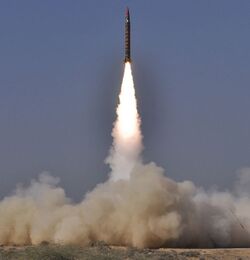Saudi Arabia/Nuclear Weapons
(Nuclear weapons) | |
|---|---|
 | |
| Saudi Arabia does not publicly admit to a nuclear weapons program |
Saudi Arabia does not admit to a nuclear weapons program. There have been reports of Saudi Arabia's intent to purchase nuclear weapons. In 2003, a leaked strategy paper laid out three possible options for the Saudi government: to acquire a nuclear deterrent, to ally with and become protected by an existing nuclear nation, or to try to reach agreement on having a nuclear-free Middle East.[1]
Contents
Pakistan's involvement
It is widely believed that Saudi Arabia has been a major financier of Pakistan's own integrated atomic bomb project since 1974, a programme founded by former prime minister Zulfikar Ali Bhutto.[2][3] In the 1980s, Chief Martial Law Administrator and President General Zia-ul-Haq paid a state visit to Saudi Arabia where he unofficially told the King that: "Our achievements are yours".[2] Since 1998, Western diplomats and intelligence agencies have long believed that an agreement exists in which Pakistan would sell Saudi Arabia nuclear warheads and its own nuclear technology should security in the Persian Gulf deteriorate.[3]
In 2010, in a statement issued by the Pakistan Embassy in Saudi Arabia, ambassador Mohammed Naeem Khan was quoted as saying that: "Pakistan considers the security of Saudi Arabia not just as a diplomatic or an internal matter but as a personal matter."[4]
Israeli-Saudi's nuclear collaboration
Western security agencies believe that Israel is selling nuclear information to Saudi Arabia. According to Israeli writer Ami Dor-on, such information will give the government in Riyadh nuclear weapons capabilities.[5]
Saudi financing of Iraqi nuclear program
In 1994, Mohammed al Khilewi, second-in-command of the Saudi mission to the United Nations, applied for asylum in the United States. He provided a packet of 10,000 documents [Citation Needed] that allegedly described long-time Saudi support of the Iraqi nuclear weapons program.[6] Senior Clinton administration officials responsible for Mideast affairs said they found nothing in Khilewi's debriefings to back up the Media reports about a Saudi nuclear program.
2013
In November 2013, a variety of sources told BBC Newsnight that Saudi Arabia had invested in Pakistans nuclear weapons projects and believes it could obtain nuclear bombs at will. Earlier in the year, a senior NATO decision maker told Mark Urban that he had seen intelligence reporting that nuclear weapons made in Pakistan on behalf of Saudi Arabia are now sitting ready for delivery.[7]
Response
A US based think-tank, the Center for Strategic and International Studies, questions validity and/or credibility of the BBC’s sources.[8]
2015
The Sunday Times of London publishes an article along similar lines as Mark Urban in 2013.[9]
Missile capability
In 1987, Saudi Arabia purchased Chinese-made intermediate-range ballistic missiles[10] designed and used by the Chinese as a nuclear-armed missile, but reportedly sold to Saudi Arabia with conventional high-explosive warheads. However their low circular error probable accuracy (1–1.5 km) makes them unsuitable for effective military use against military targets when carrying a conventional warhead.[11] The CSS-2 has a range of 4,8 km. These missiles were delivered with between 35 and 50 transporter erector launcher trucks.[12] These missiles were the first weapons of the Royal Saudi Strategic Missile Force, a separate branch of Saudi Arabia's armed forces. In 2013 the existence of the Royal Saudi Strategic Missile Force was officially announced.[13]
Newsweek reported from an anonymous source in 2014 that Saudi Arabia had acquired newer intermediate-range ballistic missiles from China in 2007 with "Washington's quiet approval on the condition that CIA technical experts could verify they were not designed to carry nuclear warheads".[14] The Center for Strategic and International Studies lists the CSS-5 as being capable of carrying either 250-kiloton or 500-kiloton nuclear or various types of conventional high-explosive warheads.[15]
References
- ↑ https://web.archive.org/web/20070210020335/http://www.nti.org/e_research/e3_40a.html
- ↑ a b https://web.archive.org/web/20120205150154/http://www.brookings.edu/opinions/2008/0128_saudi_arabia_riedel.aspx
- ↑ a b https://web.archive.org/web/20120210201716/http://www.theaustralian.com.au/news/world/saudi-arabia-to-acquire-nuclear-weapons-to-counter-iran/story-fnb64oi6-1226268171576 The Australian (originally from The Times)
- ↑ https://web.archive.org/web/20120213030211/http://worldnews.msnbc.msn.com/_news/2012/02/10/10369793-report-saudi-arabia-to-buy-nukes-if-iran-tests-a-bomb
- ↑ https://web.archive.org/web/20180720225439/https://www.middleeastmonitor.com/20180531-israel-is-selling-nuclear-information-to-saudi-arabia/
- ↑ https://web.archive.org/web/20070518062207/http://www.globalsecurity.org/wmd/world/saudi/index.html
- ↑ https://web.archive.org/web/20131107025033/http://www.bbc.co.uk/news/world-middle-east-24823846
- ↑ https://web.archive.org/web/20140714205353/http://poniforum.csis.org/blog/no-price-is-right-why-the-bbc-is-incorrect-about-a-saudi-arabia-p
- ↑ https://web.archive.org/web/20150522014241/http://www.thesundaytimes.co.uk/sto/news/world_news/Middle_East/article1557090.ece
- ↑ https://web.archive.org/web/20170913185022/http://foreignpolicy.com/2014/01/30/why-did-saudi-arabia-buy-chinese-missiles
- ↑ https://web.archive.org/web/20171204171821/https://fas.org/nuke/guide/china/theater/df-3a.htm
- ↑ https://web.archive.org/web/20080524155801/http://www.missilethreat.com/missilesoftheworld/id.3/missile_detail.asp
- ↑ Original source in Arabic
- ↑ https://web.archive.org/web/20160917172201/http://www.newsweek.com/exclusive-cia-helped-saudis-secret-chinese-missile-deal-227283
- ↑ https://web.archive.org/web/20170327131012/https://missilethreat.csis.org/missile/df-21/
Wikipedia is not affiliated with Wikispooks. Original page source here